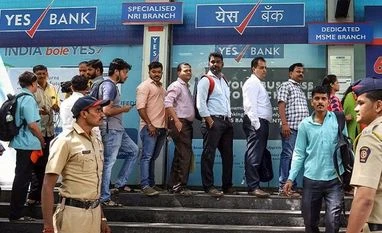Shares of YES Bank have jumped 2.3 times in just two trading sessions, from Rs 25.5 on Friday to Rs 58.7 on Tuesday. This despite the benchmark Nifty nosediving 10 per cent during the same period.
So what explains the surreal gain in the troubled private sector lender’s stock price?
First, the Rs 10,000-crore infusion from a clutch of marquee financial institutions, including State Bank of India (SBI), ICICI Bank, and HDFC, as part of the restructuring plan. With noteworthy domestic investors pumping money into the beleaguered bank and the moratorium on the lender to be lifted Wednesday evening, global rating firm Moody’s was quick to upgrade its outlook on YES Bank to positive. This had an implication on its stock price on Tuesday. “Given the new capital raised and the AT-1 (additional tier-1) capital securities write-down, Moody's expects YES Bank's solvency has improved and that the recovery rates for the bank’s depositors and senior creditors will be very high, supporting the current credit ratings,” the agency noted.
Further, in Tuesday’s press meet chaired by the bank’s administrator, the management clarified that the entire stressed loans were fully recognised in its December quarter results, a factor that should instil confidence in the existing and new investors of YES Bank.
These developments are a big turn as compared to the bank’s position until recently. For example, the bank had seen its deposits shrinking a whopping 27 per cent sequentially to Rs 1.65 trillion at the end of December quarter. This figure has further shrunk to Rs 1.34 trillion between January and March 4. Deposits, too, had shrunk by about a sixth, sequentially, at the end of the December quarter.
The second aspect fuelling the current stock rally is more the controversial three-year lock-in on 75 per cent of the shares — both existing and newly issued. It is worth noting that the Nifty had hit the 10 per cent down limit in Friday’s trade before rebounding 16 per cent. Several banking and financial stocks had swung more than 30 per cent intra-day, making it a fertile ground for traders.
Given the weak market sentiment, particularly towards financial stocks, there were several open short positions in YES Bank at Friday’s market close. Over the weekend, the government announced details of the restructuring plan, under which SBI would pump in Rs 6,050 crore and get a 48.2 per cent stake in YES Bank, while ICICI Bank and HDFC would invest Rs 1,000 crore each, and would get an 8 per cent stake each. Meanwhile, five others would also invest between Rs 250 crore and Rs 600 crore.
These eight investors would be issued 10.2 billion shares (fresh equity) at Rs 10 each. The move would augment YES Bank’s equity base from the existing 2.55 billion shares to 12.55 billion shares on a post-diluted basis.
Source: BSE; Note: *Based on current price and issuance price for new equity
Given the huge dilution, the stock price of YES Bank will get adjusted — as it does in an event of a bonus or stock split — once the new ones are issued (likely on Wednesday). However, the supply in the YES Bank counter will not be proportionate as 75 per cent of the issuance has a lock-in. Moreover, none of these large banks/financial institutions will be selling; in fact, the SBI chairman has said that the bank will not sell any YES Bank shares for three years. But the valuation metric will most likely change.
At the current price of Rs 58.7, the adjusted price works out to Rs 20 per share -- the weighted average value of current and newly issued shares. The adjusted price is double of the infusion price for new equity at the prevailing market rate.
While analysts say that at Rs 18,564 crore of loss in the December quarter, the bank's adjusted book value has almost eroded, a back-of-the-envelope calculation assuming Rs 10 per share as book value (or face value of new investments), YES Bank's price-to-book ratio based on the above-mentioned adjusted price works to 2 times. At these levels, YES Bank overtakes IndusInd Bank's 1.87 and is a tad lower than 2.1 times for Axis Bank, in terms of valuations.
But, if one considers Friday’s price of Rs 25.5, the adjusted price works out Rs 12.6 per share, a premium of 26 per cent to the price at which the nine institutions have got the share. Analysts say some premium over the infusion price is warranted as the SBI-led restructuring is tipped to revive the bank’s fortune. Market players say the premium should be between 20 per cent and 50 per cent, depending on how the depositors react once the moratorium ends. Depositor support and the new capital would give YES Bank to turn a new chapter, many are hoping.
So, what justifies the huge premium that the market was willing to pay on Tuesday? The answer to that is trapping of short positions. As the lock-in was announced without prior notice, short-sellers in derivatives, as well as cash segment (many had borrowed through the stock lending and borrowing mechanism), had to cover their positions. Add to that the complications created for exchange-traded funds (ETFs), which hold YES Bank as part of their Nifty and Bank Nifty basket. Further, the lock-in requirement reduced the free-float by 75 per cent, forcing short-sellers to pay top dollar to cover their positions. Also, given the expectations of change in fortunes of the bank, existing investors weren’t willing to let go of the shares that easily.
Unlock 30+ premium stories daily hand-picked by our editors, across devices on browser and app.
Pick your 5 favourite companies, get a daily email with all news updates on them.
Full access to our intuitive epaper - clip, save, share articles from any device; newspaper archives from 2006.
Preferential invites to Business Standard events.
Curated newsletters on markets, personal finance, policy & politics, start-ups, technology, and more.
)